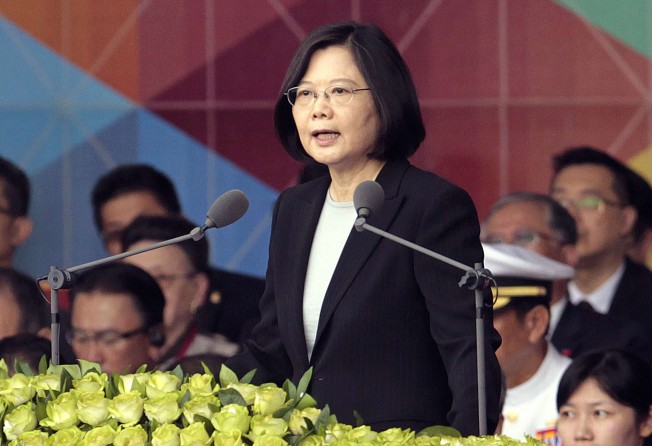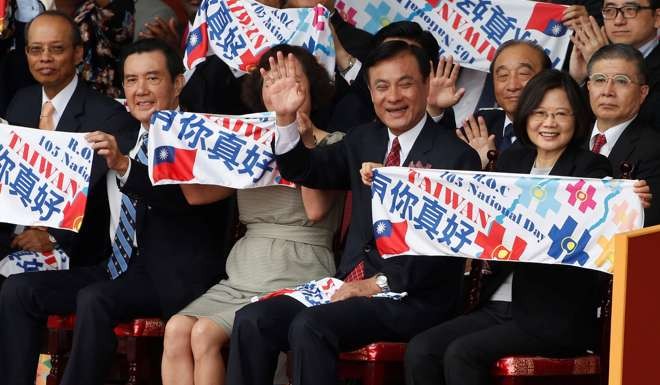Taiwan’s President Tsai Ing-wen continues call for Beijing talks but refuses to accept ‘one China’ principle
In National Day speech she also urges mainland to accept ‘Republic of China exists’ and that people of Taiwan have ‘unshakeable faith in democratic system’

Taiwan’s President Tsai Ing-wen is likely to have upset Beijing on Monday after she repeated her often-expressed hopes of holding talks with the mainland while refusing to accept the “one China” principle in her first National Day speech as the island’s president.
Observers noted that Tsai respected the historical facts concerning the meeting between the two sides in 1992, which had led to more than 20 years of cross-strait interactions.
Watch: Taiwan president’s speech at National Day parade
However, she avoided referring by name to the “1992 consensus” – something that Beijing has repeatedly stated is the sole political foundation warranting continued talks and exchanges.
“We respect the historical fact that in 1992 the two institutions representing each side across the strait held a meeting, ” Tsai said in her first address marking Taiwan’s national day.
But she declined to refer to the “1992 consensus” – the key words that refer to the one-China principle, which are considered unacceptable by DPP members.
“We advocate that both sides must collectively cherish and sustain the results of more than 20 years of cross-strait interactions and negotiations since 1992,” she said.
“The new government will conduct cross-strait affairs in accordance with the Constitution of the Republic of China [Taiwan’s official title], the Act Governing Relations between the People of the Taiwan and Mainland Areas, and other relevant legislation,” Tsai said.
She called on Beijing to resume talks with Taipei while stressing that she would never go back on her comments about her cross-strait policy made during her inaugural speech in May, when promising to maintain the status-quo and promote consistent, predictable and sustainable relations with the mainland.

On Monday Tsai urged the mainland to face up to the reality that “the Republic of China exists, and that the people of Taiwan have an unshakeable faith in the democratic system”.
She also said the two sides should sit down and talk as soon as possible.
“Anything can be included for discussion, as long as it is conducive to the development of cross-strait peace and the welfare of people on both sides,” she told more than 10,000 dignitaries, including 300 from other countries and former president Ma Ying-jeou, at the ceremony marked by a parade of military personnel and various cultural performances.
“Although cross-strait relations have seen certain ups and downs in the past months, our position remains consistent and firm,” Tsai said.
However, she stressed: “We will not bow to pressure and we will, of course, not revert to the old path of confrontation.”
Beijing has suspended talks and other official channels of communication with Tsai’s government since June in what was seen as a move to pressure Tsai into accepting the “1992 consensus” – an understanding that allows the two sides to talk while recognising that there is only one China, although each can have its own interpretation of what that stands for.
Tsai, of the independence-leaning Democratic Progressive Party (DPP), pledged in her May speech to maintain the status quo in line with the ROC constitution and even acknowledged the historic fact about the meeting.
Beijing still regards Taiwan as a part of the mainland awaiting eventual unification, and has threatened to take it by force if necessary. But pro-independence supporters loathe the idea and have called instead for Taiwan’s formal independence.
Relations between the two sides had been bitter since the end of a civil war in 1949, but grew warmer when Ma Ying-jeou of the mainland-friendly Kuomintang became president in 2008 and adopted a policy to engage Beijing as well as support the 1992 consensus.
However, Taiwan’s relations with Beijing cooled off quickly after Tsai was elected president.
The number of mainland tourists visiting Taiwan in tour groups during China’s week-long National Day holiday plunged by 227. 7 per cent compared with a year earlier, according to mainland official figures.